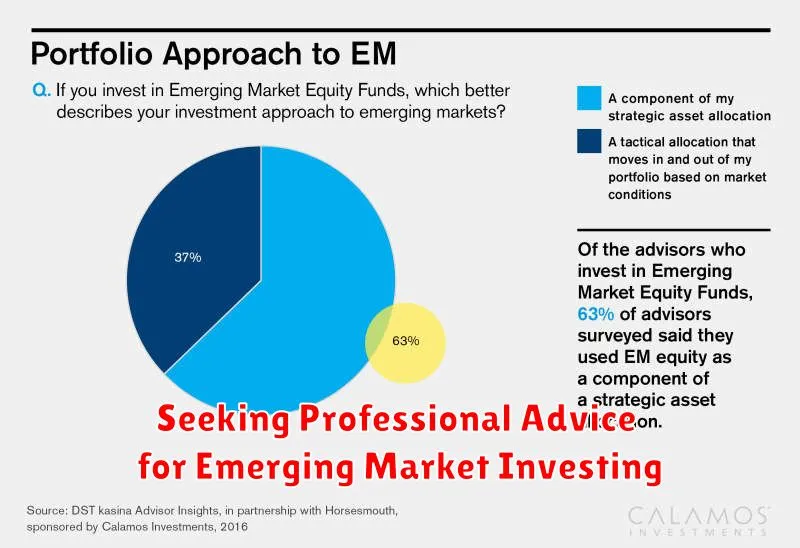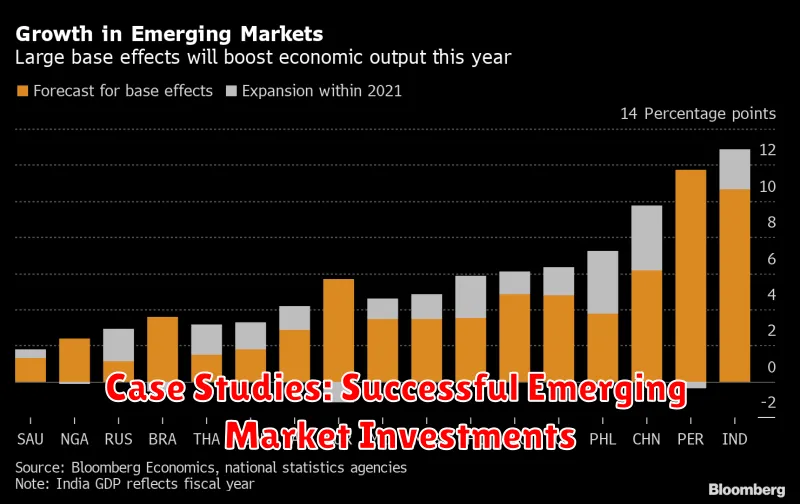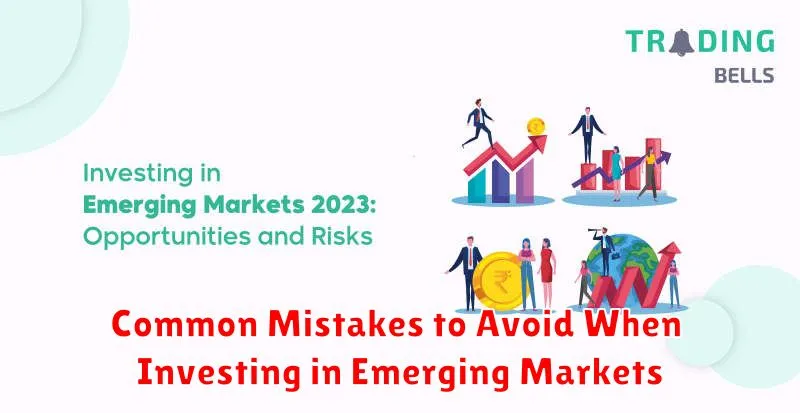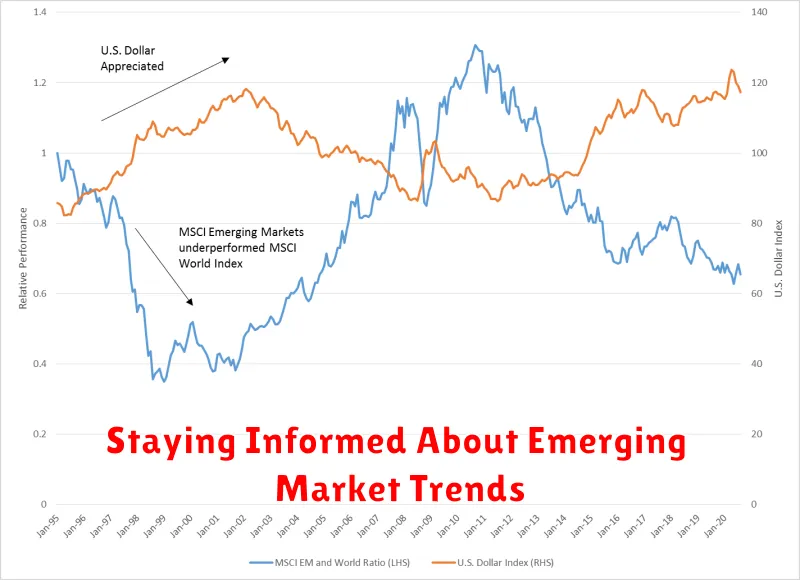Are you looking for ways to boost your investment portfolio and maximize your returns? Look no further than emerging markets. While investing in emerging markets can seem intimidating, it can offer the potential for significant gains. Emerging markets are characterized by rapid economic growth, burgeoning populations, and a rising middle class, all factors that can drive strong investment returns.
Investing in emerging markets can expose you to a world of exciting investment opportunities. From technology companies in China to consumer goods in India, these markets offer diverse avenues for growth. But it’s crucial to approach emerging markets with a strategic mindset. This article will provide you with a comprehensive guide on how to navigate the landscape of emerging markets, equipping you with the knowledge to make informed investment decisions.
What are Emerging Markets?
Emerging markets are economies that are in the process of rapid growth and industrialization. These countries typically have a lower per capita income than developed economies, but they are experiencing a rise in economic activity, investment, and living standards.
Some common characteristics of emerging markets include:
- Rapid economic growth: Emerging markets often experience high GDP growth rates, driven by factors such as industrialization, urbanization, and technological advancements.
- Growing middle class: As incomes rise, a significant portion of the population enters the middle class, leading to increased consumer spending and demand for goods and services.
- Increasing investment: Foreign and domestic investors are drawn to emerging markets by their growth potential, leading to significant investments in infrastructure, technology, and other sectors.
- Improving governance and institutions: Many emerging markets are undertaking reforms to enhance their political and economic stability, attracting greater investor confidence.
Examples of emerging markets include:
- Brazil
- Russia
- India
- China
- South Africa
The Potential Rewards of Emerging Market Investments
Emerging markets offer investors the potential for significant returns, driven by factors such as rapid economic growth, increasing urbanization, and rising consumer spending. These economies are often characterized by a younger and growing population, which translates into a larger workforce and a greater potential for innovation.
One of the key advantages of investing in emerging markets is the potential for higher growth rates compared to developed economies. As these countries develop and modernize, they experience rapid economic expansion, leading to higher corporate earnings and stock market gains.
Another advantage is the potential for increased diversification in an investment portfolio. Emerging markets tend to have lower correlations with developed markets, meaning their performance is less influenced by economic fluctuations in the developed world. This diversification can help mitigate risk and enhance overall portfolio returns.
Moreover, emerging markets often present attractive valuations compared to their developed counterparts. As these economies grow and mature, companies within these markets may be undervalued, offering investors the opportunity to acquire shares at a lower price and potentially benefit from future growth.
It’s important to acknowledge that emerging markets also come with inherent risks, such as political instability, regulatory uncertainties, and currency volatility. However, by conducting thorough research, diversifying investments, and adopting a long-term perspective, investors can potentially capitalize on the significant rewards that these markets have to offer.
Understanding the Risks Involved
Investing in emerging markets can offer the potential for greater returns, but it’s crucial to understand the inherent risks involved. These markets are often characterized by political instability, economic volatility, and regulatory uncertainties.
One of the most significant risks is currency fluctuation. Emerging market currencies can be highly volatile, potentially eroding your investment returns. Another key risk is lack of transparency in corporate governance and financial reporting, making it difficult to assess the true value of investments.
Furthermore, geopolitical events can have a significant impact on emerging markets. Wars, conflicts, and political upheavals can disrupt economies and lead to market instability.
It’s also important to consider liquidity risks. Emerging markets often have less developed financial systems, which can make it difficult to buy or sell investments quickly. This can limit your ability to access your capital when needed.
Different Ways to Invest in Emerging Markets
Investing in emerging markets can be a great way to diversify your portfolio and potentially earn higher returns. But with so many different options available, it can be tough to know where to start. Here are a few different ways to invest in emerging markets:
Direct Investments
One option is to invest directly in emerging market companies through stocks or bonds. You can do this by buying individual securities or investing in a mutual fund or exchange-traded fund (ETF) that focuses on emerging markets. This approach allows you to gain exposure to specific companies and sectors within these markets.
Emerging Market Funds
Another option is to invest in a mutual fund or ETF that invests in a diversified basket of emerging market securities. This is a good option for investors who want to gain exposure to a broad range of emerging markets without having to pick individual stocks or bonds. These funds offer a convenient and diversified way to access emerging markets.
Emerging Market ETFs
Similar to mutual funds, ETFs provide a diversified investment in emerging markets. ETFs are traded on stock exchanges and offer advantages like lower fees and greater transparency. You can choose ETFs based on different regions, sectors, or specific themes within emerging markets.
Emerging Market Bonds
Bonds issued by governments and companies in emerging markets offer another avenue for investment. These bonds can provide higher yields than bonds issued in developed markets. However, emerging market bonds also carry higher risk, as these countries may have less stable economies and weaker legal systems.
Real Estate
Investing in real estate in emerging markets can be another way to diversify your portfolio. This could involve investing in commercial properties, residential developments, or land. However, real estate investments can be illiquid and require significant capital, so it’s important to research the market thoroughly before investing.
Remember that investing in emerging markets comes with its own set of risks, including political instability, currency fluctuations, and economic volatility. It’s essential to conduct thorough research and consult with a financial advisor before making any investment decisions.
Choosing the Right Investment Vehicles: ETFs, Mutual Funds, or Individual Stocks?
Once you’ve decided to invest in emerging markets, you need to choose the right investment vehicles. There are three main options: exchange-traded funds (ETFs), mutual funds, and individual stocks. Each has its own advantages and disadvantages, so it’s important to carefully consider your investment goals and risk tolerance before making a decision.
ETFs
ETFs are a type of investment fund that tracks a specific index, sector, or commodity. They are bought and sold on stock exchanges like individual stocks. ETFs offer several advantages, including:
- Lower costs: ETFs typically have lower expense ratios than mutual funds.
- Diversification: ETFs provide instant diversification across a wide range of assets.
- Transparency: ETFs are required to disclose their holdings regularly, making it easier for investors to understand what they’re investing in.
Mutual Funds
Mutual funds are similar to ETFs, but they are not traded on exchanges. Instead, investors buy and sell shares directly from the fund company. Mutual funds offer several advantages, including:
- Professional management: Mutual funds are managed by experienced investment professionals.
- Diversification: Like ETFs, mutual funds offer diversification across a wide range of assets.
- Convenience: Investing in a mutual fund is a simple and convenient way to access a diversified portfolio.
Individual Stocks
Investing in individual stocks can be a good option for investors who are willing to do their own research and take on more risk. However, it’s important to note that individual stocks can be more volatile than ETFs or mutual funds.
- Higher potential returns: Individual stocks have the potential for higher returns than ETFs or mutual funds.
- Greater control: Investors who choose to invest in individual stocks have greater control over their investments.
- Higher risk: Individual stocks are more volatile than ETFs or mutual funds, and investors could lose money if the stock price declines.
Ultimately, the best investment vehicle for you will depend on your individual circumstances, goals, and risk tolerance. If you’re unsure which option is right for you, it’s always a good idea to consult with a financial advisor.
Diversification Strategies for Emerging Markets
Diversification is crucial in any investment portfolio, but it’s even more critical when investing in emerging markets. Emerging markets offer substantial growth potential but also come with unique risks, including political instability, currency fluctuations, and regulatory uncertainty. To mitigate these risks and optimize returns, investors should adopt a multi-pronged diversification strategy.
One key approach is to diversify across different emerging market sectors. Instead of focusing solely on one industry, investors should allocate funds across sectors like technology, healthcare, consumer goods, and infrastructure. This strategy helps to mitigate risk by ensuring that the portfolio isn’t overly reliant on the performance of any single sector. For instance, if the technology sector experiences a downturn, the impact on the overall portfolio will be cushioned by the performance of other sectors.
Another essential aspect of diversification is to spread investments across different emerging markets. Rather than concentrating on a single country, investors should consider a range of emerging markets with diverse economic structures and growth prospects. This approach reduces exposure to specific country risks and allows investors to benefit from the growth potential of various emerging regions.
Furthermore, investors can diversify their investments within a specific emerging market by investing in a combination of stocks, bonds, and real estate. Stocks offer the potential for higher returns but also carry more volatility. Bonds provide stability and income generation, while real estate can offer long-term appreciation and rental income. By allocating capital across these asset classes, investors create a more balanced and resilient portfolio.
Lastly, investors should consider employing a currency diversification strategy. Emerging market currencies are generally more volatile than developed market currencies. To mitigate currency risk, investors can invest in a range of currencies, including US dollars, Euros, and emerging market currencies. This strategy helps to reduce the impact of currency fluctuations on the portfolio’s overall performance.
By implementing these diversification strategies, investors can navigate the complex world of emerging markets with greater confidence and potentially unlock significant returns. However, it’s crucial to remember that diversification doesn’t guarantee profits. Thorough research, careful planning, and a long-term investment approach are essential for success in this dynamic environment.
Factors to Consider When Investing in Emerging Markets: Political Stability, Economic Growth, Currency Fluctuations
Emerging markets offer the potential for significant returns, but they also come with greater risk. Before investing in an emerging market, it’s crucial to carefully consider a number of factors, including political stability, economic growth, and currency fluctuations.
Political stability is paramount. Investors should assess the country’s political system, the strength of its institutions, and the likelihood of political turmoil. A stable political environment is essential for businesses to thrive and for investors to feel confident about their investments.
Economic growth is another key factor. Look for countries with strong economic fundamentals, such as a growing GDP, low inflation, and a healthy balance of payments. High economic growth can translate into higher corporate profits and a strong stock market.
Currency fluctuations can significantly impact returns. Emerging market currencies are often more volatile than those of developed economies. Investors should research the country’s currency policies and its susceptibility to external shocks. A weakening currency can erode returns, while a strengthening currency can boost them.
Thoroughly researching these factors will help you make informed investment decisions in emerging markets. Remember that these factors are interconnected and should be considered as a whole. By understanding the risks and opportunities associated with each country, you can increase your chances of achieving your investment goals.
Evaluating Emerging Market Companies: Financial Health, Management Quality
When investing in emerging markets, it’s crucial to understand the unique challenges and opportunities they present. One of the most critical aspects is evaluating the financial health and management quality of companies in these markets. This section will delve into these key considerations for making informed investment decisions.
Financial Health: Assessing a company’s financial health requires a comprehensive review of its key metrics, including:
- Profitability: Look for companies with consistent profitability, measured by metrics like net income margin and return on equity.
- Debt Levels: Analyze the company’s debt-to-equity ratio and interest coverage ratio to understand its financial leverage and ability to service its debts.
- Cash Flow: Assess the company’s ability to generate cash from operations, which is a crucial indicator of financial sustainability.
- Working Capital: Ensure the company effectively manages its working capital by examining its accounts receivable, inventory, and accounts payable.
Management Quality: Evaluating management quality is just as important as financial health. Here’s what to consider:
- Leadership Experience: Assess the experience, expertise, and track record of the company’s key management team.
- Corporate Governance: Look for companies with strong corporate governance practices, transparency, and accountability.
- Growth Strategy: Understand the company’s growth strategy and its ability to capitalize on market opportunities in the emerging market.
- Investor Relations: Analyze the company’s communication and interaction with investors, including transparency in financial reporting and investor communication.
Remember, investing in emerging markets carries inherent risks, but by carefully evaluating a company’s financial health and management quality, investors can make more informed decisions and enhance their chances of success.
Managing Risk in Emerging Market Investments: Asset Allocation, Stop-Loss Orders
Emerging markets offer significant potential for growth, but they also carry a higher level of risk compared to developed markets. Effectively managing risk is crucial for investors seeking to maximize returns in these dynamic environments. Two key strategies for mitigating risk in emerging market investments include asset allocation and the use of stop-loss orders.
Asset allocation is a fundamental principle that involves diversifying your investment portfolio across different asset classes. In emerging markets, this can entail allocating funds to various sectors, industries, and countries to reduce concentration risk. For example, investors might choose to invest in a mix of stocks, bonds, and real estate within a specific emerging market region. Diversification helps to mitigate losses from any single investment performing poorly.
Stop-loss orders serve as a safety mechanism to limit potential losses on individual investments. These orders instruct your broker to automatically sell an asset when its price falls below a predetermined threshold. Stop-loss orders can help prevent substantial losses in volatile markets, but they are not foolproof. It’s essential to set stop-loss levels carefully, taking into account market conditions and your investment goals.
By combining strategic asset allocation and the use of stop-loss orders, investors can build a more resilient portfolio in emerging markets. These techniques can help to manage risk effectively while still capturing the potential for strong returns that these markets offer. Remember, a well-planned investment strategy should balance risk and reward, and it’s crucial to conduct thorough research and seek professional advice before making any investment decisions.
Long-Term vs. Short-Term Investment Strategies
When considering emerging markets, investors must decide whether to adopt a long-term or short-term investment strategy. Each approach has its own advantages and disadvantages.
A long-term investment strategy is ideal for investors seeking consistent, steady growth over a prolonged period. This approach typically involves investing in a diversified portfolio of assets with a focus on fundamental analysis and a long-term horizon.
A short-term investment strategy, on the other hand, prioritizes quick returns by capitalizing on short-term market fluctuations. This approach often entails high-frequency trading, leveraging technical analysis, and a more volatile portfolio.
The choice between these strategies hinges on an investor’s risk tolerance, time horizon, and financial goals.
For those seeking long-term wealth creation and are comfortable with market volatility, a long-term investment strategy may be more suitable. This approach allows investors to weather market fluctuations and benefit from the long-term growth potential of emerging markets.
Conversely, investors seeking quick profits with a higher risk appetite might prefer a short-term investment strategy. However, this approach requires a high level of market expertise and knowledge.
Ultimately, the ideal investment strategy depends on individual circumstances and investment goals. By carefully assessing their risk tolerance, time horizon, and financial objectives, investors can choose the approach that best aligns with their investment aspirations.
Seeking Professional Advice for Emerging Market Investing

Emerging markets can offer attractive growth potential, but navigating this space can be complex. While you can certainly do your own research and build your own portfolio, seeking professional advice can be immensely valuable. Here’s why:
Expertise and Insights: Financial advisors specializing in emerging markets have the knowledge and experience to understand the unique risks and opportunities presented by these economies. They can provide insights into political and economic stability, currency fluctuations, and regulatory environments.
Diversification and Portfolio Construction: Emerging markets offer a diverse range of investment options across different sectors and industries. A professional advisor can help you build a diversified portfolio that aligns with your risk tolerance and investment goals, ensuring proper asset allocation.
Market Access and Selection: Not all emerging markets are created equal. Some may present higher risks than others. An advisor can help you identify markets with strong growth potential and navigate the complex landscape of available investment options.
Ongoing Monitoring and Management: Investing in emerging markets requires ongoing monitoring and adjustments. A financial advisor can track market trends, analyze company performance, and make necessary portfolio adjustments to maximize returns and mitigate risks.
Transparency and Accountability: Working with a reputable financial advisor provides transparency and accountability. You’ll have access to regular performance updates, clear communication about investment decisions, and a dedicated professional to address any concerns or questions.
While seeking professional advice can be an added expense, the potential benefits can significantly outweigh the cost, especially for investors who are new to emerging markets or lack the time and expertise to navigate them effectively.
The Role of Emerging Markets in a Global Portfolio
Emerging markets, characterized by rapid economic growth and development, play a crucial role in a diversified global portfolio. While they may pose greater risks compared to developed markets, they also offer potentially higher returns. Investing in emerging markets can bring several benefits, including:
- Diversification: Emerging markets offer a unique opportunity to diversify a portfolio beyond traditional developed markets, mitigating overall risk and enhancing potential returns.
- Growth Potential: Emerging economies typically exhibit higher growth rates than developed economies, driven by factors such as population growth, rising middle class, and industrialization.
- Valuation Opportunities: Emerging market assets may be undervalued compared to developed market counterparts, presenting attractive investment opportunities.
- Long-Term Returns: Historically, emerging markets have demonstrated significant long-term growth potential, providing attractive returns to investors with a long-term perspective.
However, it’s important to acknowledge the risks associated with emerging markets:
- Volatility: Emerging markets can experience greater volatility due to factors like political instability, economic fluctuations, and currency fluctuations.
- Liquidity Risk: Trading volumes and market liquidity may be lower in emerging markets, making it challenging to enter and exit positions efficiently.
- Regulatory Uncertainty: Emerging markets may have less developed regulatory frameworks, creating potential risks for investors.
Despite the risks, emerging markets can be a valuable addition to a global portfolio. A well-balanced approach, considering factors like risk tolerance, investment horizon, and diversification, is essential when navigating this dynamic asset class.
Case Studies: Successful Emerging Market Investments

Investing in emerging markets can be a rewarding endeavor, but it’s essential to understand the potential risks and opportunities. To illustrate the potential for success, let’s explore some real-world case studies of successful emerging market investments.
One notable example is the investment in Taiwan Semiconductor Manufacturing Company (TSMC), a Taiwanese multinational semiconductor company. Despite geopolitical uncertainties and trade tensions, TSMC has consistently delivered strong returns for investors. The company’s dominance in the semiconductor industry and its strategic location in Taiwan have fueled its growth. By investing in TSMC, investors have benefited from the rapid expansion of the global electronics market and the increasing demand for advanced chips.
Another compelling case study involves Alibaba, a Chinese e-commerce giant. Since its inception, Alibaba has revolutionized online shopping in China and beyond. Investors who recognized the company’s potential and its dominant position in the Chinese e-commerce market have reaped significant rewards. Alibaba’s growth has been driven by the expanding middle class in China, the rapid adoption of online shopping, and its diverse range of businesses, including cloud computing and digital payments.
These examples highlight the potential for high returns in emerging markets. However, it’s crucial to remember that success is not guaranteed. Proper research, diversification, and a long-term investment horizon are essential for navigating the complexities and volatility of emerging markets. By carefully selecting companies with strong fundamentals, innovative business models, and robust growth prospects, investors can potentially achieve substantial returns on their investments.
Common Mistakes to Avoid When Investing in Emerging Markets

Investing in emerging markets can be an exciting prospect, offering the potential for higher returns compared to developed markets. However, it’s crucial to be aware of the common mistakes investors make when venturing into these markets. Understanding these pitfalls can help you navigate the complexities of emerging markets investing and maximize your chances of success.
Overlooking Political and Economic Risks: Emerging markets are often characterized by political instability, currency fluctuations, and economic volatility. Ignoring these risks can lead to significant losses. Thorough research is essential to understand the political and economic landscape of the target country and assess the potential for instability.
Focusing Solely on Short-Term Returns: Emerging markets often experience rapid growth spurts, tempting investors to focus on short-term profits. However, this strategy can be risky as market volatility can quickly erode gains. A long-term perspective is crucial for success in emerging markets, as it allows you to ride out short-term fluctuations and benefit from the long-term growth potential.
Ignoring Currency Risk: Emerging market currencies can be highly volatile, and fluctuations can significantly impact returns. Consider hedging currency risk by investing in a diversified portfolio of emerging market assets or using currency-hedged funds. Alternatively, investing in companies with strong US dollar revenues can help mitigate currency risk.
Lack of Diversification: Investing in just one or two emerging markets can be risky due to the inherent volatility of these markets. Diversifying your portfolio across multiple emerging markets and different asset classes helps reduce risk and enhance potential returns.
Failing to Conduct Thorough Due Diligence: Investing in emerging markets requires meticulous research and due diligence. Thoroughly investigate the companies you’re considering, analyze their financial statements, assess their management team, and understand their competitive landscape. Ensure you understand the risks involved and have a clear exit strategy in case of unforeseen circumstances.
By avoiding these common mistakes, you can navigate the complexities of emerging market investing with greater confidence and potentially achieve higher returns over the long term. Remember, careful planning, thorough research, and a long-term perspective are essential for success in these dynamic markets.
Staying Informed About Emerging Market Trends

Staying informed about emerging market trends is crucial for making successful investments. These markets are dynamic and constantly evolving, presenting both opportunities and risks. A deep understanding of the key drivers of growth and challenges in emerging markets can help investors make informed decisions.
To stay on top of the trends, consider the following strategies:
- Follow reputable financial news sources: Websites and publications focused on emerging markets, such as the Financial Times, Bloomberg, and the Economist, provide insightful analysis and updates.
- Read reports from investment banks and research firms: These institutions often publish detailed research on specific emerging markets, covering macroeconomic factors, industry trends, and company valuations.
- Attend industry conferences and webinars: These events offer opportunities to network with experts and gain insights from presentations and discussions.
- Monitor social media: Online platforms like Twitter and LinkedIn can provide real-time updates and perspectives from industry leaders and analysts.
- Engage with local experts: If you’re considering investing in a specific emerging market, connect with individuals who have local knowledge and expertise.

